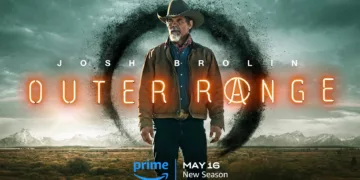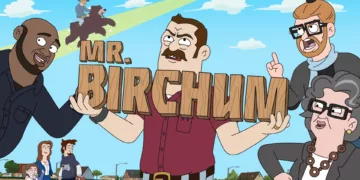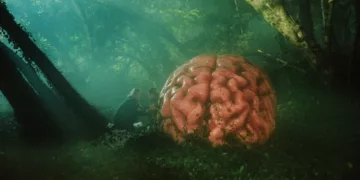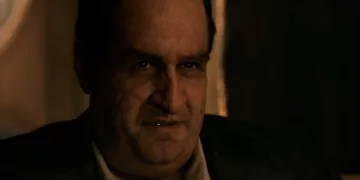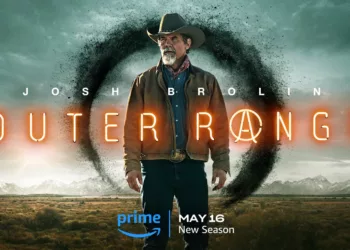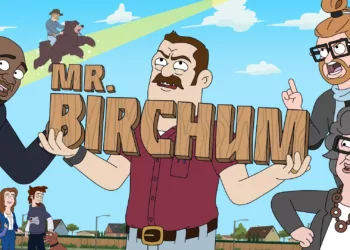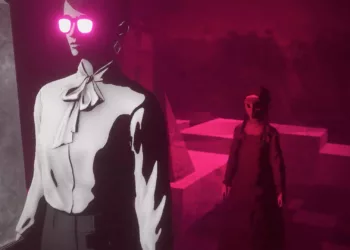CBS gambles on a familiar formula with a charismatic lead in Tracker, their new procedural drama developed for the prized post-Super Bowl slot. Centered on the adventures of Colter Shaw, a brooding hero who travels the country in an Airstream solving missing persons cases for profit, the show balances classic genre tropes with contemporary style.
As the titular tracker, actor Justin Hartley (This Is Us) brings rugged magnetism to the role of Colter, a bushcraft-skilled survivalist who puts his abilities to unique use. When there’s a reward offered for a lost person or possession, Colter takes the case, tracking them down with almost supernatural efficacy. Self-styled as a “rewardist,” he’s less bounty hunter than a wanderer devoted to reuniting the lost with their loved ones – for the right price.
With executive producer Ken Olin (Thirtysomething) behind the camera lending a polished look, Tracker clearly aims for the sweet spot between familiar and fresh. The weekly case structure will comfort procedural fans, while the backcountry adventuring and Hartley’s outsider appeal brings a modern edge. And with hints of darkness in Colter’s past, there’s potential for growth beyond the initial ‘man hunting things’ logline. It remains to be seen whether the formula and star power can capture viewers, but Tracker brings professional craft and confidence to its first mystery-of-the-week.
Hartley’s Star Vehicle
As This Is Us recedes in the rearview, Justin Hartley cruises into a new leading role behind the wheel of Tracker. And with his easy charisma and outdoorsman aesthetic, it’s a snug fit for both Hartley and viewers right from the start.
As Colter Shaw, Hartley leaves the sweaters behind for leather and denim, exuding calm capability whether talking a jumper down from a ledge or cleaning his rifle. It’s a commanding presence, with Hartley’s 6’2″ frame and sharp features filling out the character of a man more at home sleeping under the stars than stuck in city traffic.
Yet Hartley keeps Colter relatable through little gestures and flashes of humor, like his amusing one-sided chats with the dog he inherits each episode. As he tracks leads the old-fashioned way with shoe leather and deduction, Hartley avoids making Colter seem like a backwoods superhero by playing the action at human scale. And when bullets inevitably fly, Hartley lets real fear and fatigue show through the bravado.
Of course, Hartley also draws on his experience projecting vulnerability from This Is Us. In glimpses of Colter’s tragic past, Hartley’s expressive eyes convey depths of sorrow and hints this stoic hero may harbor secret wounds. And while he keeps romantic interests at arm’s length as a true lone wolf, Hartley generates palpable chemistry with each week’s guest star. Like Clooney’s signature squint or Gosling’s knowing smirk, Hartley’s subtle charm promises Tracking will lure its share of devoted fans.
So while the show lives or dies each week on the strength of its cases, Hartley’s rock-solid performance means viewers can count on Colter Shaw to always save the day. Tracker maystill be finding its footing, but in Hartley audiences have a reliable guide they’ll want to follow anywhere.
“Delve into the enigmatic world of Iris in A Traveler’s Needs, where minimalism meets depth in a narrative that challenges the boundaries of language and connection. Join Isabelle Huppert in a performance that masterfully captures the essence of a stranger’s journey through Seoul, inviting viewers to ponder the complexities of human interaction.”
Colter’s Crew
A lone wolf needs a pack, and Colter Shaw has assembled a loyal support team to have his back each week. As he roams the Pacific Northwest in his weathered 4×4 seeking the lost, this ragtag group provides intel, tech support, legal help and plenty of banter to leaven Tracker’s grim journeys.
Robin Weigert (Deadwood) and Chicago comedian Abby McEnany (Work in Progress) make an unlikely pair as Velma and Teddi, a hippie-ish married couple who serve as Colter’s dispatchers and den mothers. Like everyone in Colter’s orbit, they have their own damaged pasts, which Weigert and McEnany hint at with eccentric chemistry and emotional warmth.
When social engineering can’t get the job done, Colter calls on computer whiz Bobby (Eric Graise), a disabled veteran whose mad keyboard skills uncover leads even the dark web can’t hide. Graise brings vibrant energy to the role, joking with Colter like an old Army buddy.
And when our hero inevitably bends the rules past breaking, attorney Reenie (Fiona Rene) rides to the questionable legal rescue. Rene cleverly portrays Reenie’s mix of sexual tension and frustration with Colter through sharp comic timing.
Tracker strives to build its world each week via new settings and locals crucial to cracking the latest case. But it’s this recurring unit that gathers around their friend in need to push Colter’s roadside detective business down the lonesome highways. Smart, courageous and coolly capable, they’ve always got an open phone line when things get rough for their wandering pal.
Tracking Down Leads
Like most procedurals, the lifeblood of Tracker flows from its weekly mysteries. In the vein of The Fugitive’s one-armed man or The Incredible Hulk’s search for a cure, the show banks on original cases to hook viewers even when we know each puzzle will get solved in an hour. Luckily, the premiѐre episodes offer a promising start.
The pilot drops Colter into the backwoods of Oregon, searching for a kidnapped teenager. Tracing shaky leads from the boy’s estranged father to a roadside burger joint, Shaw uses old-school legwork and intuition to uncover a surprising abductor. While predictably far-fetched, the twists keep things lively.
The second episode “Springhill” provides a stronger template going forward. Tracking a missing woman to an idyllic resort town, Colter uncovers dark secrets lurking beneath the posh veneer. The sharp setting contrasts and multitude of suspects with motives adds uptown zing. We get car chases, money laundering, and even a rooftop shootout straight out of an 80s thriller.
Other early cases include rescuing a zoo’s suicidal elephant and recovering stolen Native American artifacts, showing the potential for more offbeat adventures. Like addiction, the key will be avoiding repetition and upping the dramatic ante just enough to deliver a satisfying weekly fix.
Of course, the storytelling also lives or dies through execution. Here the news is mixed. At their best, the mysteries offer unusual settings to leverage Colter’s backcountry skills. But too often the show falls back on TV shorthand like night vision goggles, luxury hotels and other well-worn tropes.
Uneven writing also underserves the guest stars. Tracker hopes to attract notable talent, but when complex roles get reduced to two dimensions they have little to work with. Still, there’s enough promise in the early episodes to hope for improvement as the staff gains experience.
At heart, Tracker wants the comfort-food appeal of throwback procedurals like Murder She Wrote fused with a modern survivalist gloss. It hasn’t fully bridged that gap yet when it comes to its cases, but the elements are there to reward patient viewers. As long as audiences stick around to let the creators find their path, Colter Shaw should still have many more mysteries to solve.
“Dive into the heart-pounding action of Seoul’s underworld with our The Roundup: Punishment review. Follow Detective Ma as he faces off against cybercriminals and mercenaries in this gripping Korean action thriller. With its spectacular fight choreography and Ma Dong-seok’s commanding presence, experience a cinematic journey filled with adrenaline-pumping sequences and unexpected twists.”
Haunted Past, Hopeful Future
While the weekly victims keep Colter’s skills sharp in the present, echoes of his past trauma trail him like ghosts. Tracker takes the familiar approach of many procedurals by pairing episodic cases with an overarching personal mystery, revealed in fragments over the first season. For Colter Shaw, his future remains hostage to tragic events from childhood that still haunt his dreams.
The pilot drops hints of long-buried family secrets tied to Colter’s off-the-grid upbringing. Cryptic calls from his estranged brother Russell tempt Colter to confront memories of their survivalist father Ashton he’d rather leave buried in the woods. But their remote homestead hides a violent history that ripped the Shaws apart.
Between adventures tracking his weekly quarry, Colter also follows leads on Russell, hoping to uncover if his beloved brother played a role in their family’s destruction. But weary and cynical from his isolated life on the road, Colter remains reluctant to revisit old wounds. Only through reconciling his past can he move forward in peace.
This simmering trauma informs Colter’s motives and worldview each episode. His desire to rescue those lost – like himself – in the wilderness drives Colter more than any monetary reward. And his reluctance to forge human connections mirrors the heartbreak of his childhood bonds torn asunder. Yet Colter retains faith that some problems still can be solved if you have the right skills.
Tracker clearly hopes this central mystery provides an emotional anchor that keeps viewers coming back until the show finds its groove. By building intrigue around the errant Russell and cryptic origins of Colter’s feral upbringing, audiences have reason to stay invested despite uneven early episodes. It’s a time-tested tactic for fledgling procedurals to buy time for learning on the job.
With luck, the Shaw family skeletons eventually will rest in peace. But until Colter comes to terms with the secrets of his past, his restless spirit remains doomed to wander the back roads—finding everyone but himself.
A Gritty Throwback
With its windswept Pacific Northwest settings andHartley’s flannel & denim wardrobe, Tracker channels an unvarnished 90s vibe harkening back to Northern Exposure or Twin Peaks. Trading skyscrapers for snow-capped slopes, the show conjures the region’s mythic frontier spirit, where self-reliant men wrestle nature’s indifference through rugged capability and American know-how.
Tracker emulates the stoic machismo of other CBS procedurals, dropping Colter into grim crises each week with only his wits and wilderness skills to survive. And like Jack Reacher or MacGyver, his proficiency with firearms and fists borders on the superhuman. Audiences craving action get artfully staged shootouts and car stunts to satiate their thirst for vicarious thrills.
Yet the show strives for more than just sensory pleasures. The pilot’s missing child case explores sober issues like opioid addiction, income inequality and the failure of social services through its lens of crime investigation. While not preachy, the show acknowledges real tragedies underlying the entertaining fiction as a sop to more discerning viewers.
Of course, the series format also demands lightness to balance the dark. Here Tracker finds humor through Colter’s oddball team of misfit friends, providing comic banter and the occasional meet-cute romantic beat. His chemistry with attorney Reenie promises some will-they-won’t-they tension down the line.
Overall, Tracker’s moody Pacific Northwest backdrop provides an elemental palette well-suited to paint stirring tales about everyday people lost and found. Striving for both gravity and fun, its uneven start shows occasional flashes of brilliance if creators can tap the full potential.
What the Future Holds
Like its hero, Tracker remains very much a work in progress. The procedural format presents a demanding creative challenge, requiring inventive one-off stories fueled by compelling characters. This inevitably takes time to master, even for seasoned writers. So while the premiѐre episodes show uneven moments, there’s ample reason to stay hopeful.
The foundations for something special are plainly visible. In Hartley’s magnetic performance the show has a star to hang its Stetson on. The rich Pacific Northwest setting provides atmosphere and texture difficult to fake. And the backcountry survival concept offers ample room to showcase unique weekly locations and predicaments. Peppered with occasional stunts and effects, it’s built to satisfy viewers seeking brisk Sunday night entertainment.
Yet realizing that potential will demand improving on the execution. The writers’ room needs to avoid leaning on predictable crime drama clichés in crafting their intricate plots. Formulaic beats like hostage standoffs and false accused suspects may check familiar boxes, but they undermine building the show’s unique identity.
The guest casting also needs more thought to populate Colter’s world each week with authentic, textured foils and allies. Complex characters stoke inspiration even for talented actors given underwhelming material.
But these are surmountable growing pains for addressing over time. The appeal of Hartley and his Highway Detectives promises enough initial fans willing to let slow-burning Colter Shaw win them over the long haul. With luck and commitment from CBS, Tracker may yet evolve into the network’s next reliable procedural Beast — if it can stay Found.
The Review
Tracker
With rugged charisma from Justin Hartley and the intrigue of a backcountry procedural format, Tracker shows promise if creators can transcend uneven writing. For memorable mysteries and an appealing guide, it’s worth packing your gear to hit the trails with Colter Shaw.
PROS
- Strong lead performance by Justin Hartley
- Intriguing backcountry survivalist premise
- Potential for visually compelling Pacific Northwest settings
- Dedicated supporting cast brings humor and heart
- Backstory mystery offers anchoring emotional arc
CONS
- Uneven quality of weekly cases
- Over-reliance on tired procedural tropes
- Stilted dialogue and underdeveloped guest roles
- Needs time to develop true creative identity


